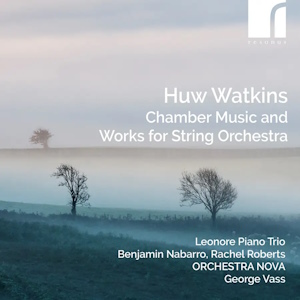
Huw Watkins (b. 1976)
Piano Trio No. 1 (2009)
Little Symphony for string orchestra (2013)
Piano Quartet (2012)
Concertino (2011)
Piano Trio No. 2 (2022)
Leonore Piano Trio
Benjamin Nabarro (violin: Concertino)
Rachel Roberts (viola: Quartet)
Orchestra Nova/George Vass
rec. 2023, St. John the Evangelist, Oxford, UK
Resonus RES10338 [71]
I knew Huw Watkins was a composer as well as a pianist, but this is the first time I have heard some of his music. He is a leading contemporary Welsh composer, a successor to such luminaries as William Mathias and Grace Williams. He writes in an accessible contemporary idiom for which my nearest comparison would be Tippett. However, Tippett wrote little chamber music apart from his cycle of string quartets, whereas Watkins has written a good deal.
The disc opens and closes with Watkins’s two Piano Trios. The first is in three movements. It opens with striking and attractive ideas on the piano, which are answered by the strings in a more lyrical manner. The central slow movement is serene but gradually gets more anguished with two big climaxes. The finale is a jig, Holstian in character, with irregular accents and sudden interruptions. After the first Trio we have the Little Symphony, a short work lasting fifteen minutes in a single movement. There are vigorous rhythmic ideas which alternate with more lyrical writing – it was this which put me in mind of the first movement of Tippett’s third symphony. The Piano Quartet is also a single movement, though in four sections which play continuously. The opening and close are quiet but the middle is lively and unsettled. The Concertino is for violin and string orchestra. Again, this is a single movement. It begins with the soloist expounding a rather jagged theme with pizzicato interjections from the orchestra. There is a quieter section before the faster material returns and builds to a climax. The end is melancholy. As indeed is the second Piano Trio. This is another one movement work divided into four sections, with two slower sections preceding two faster ones with a dramatic ending.
The performances here are committed and authoritative and the recordings, though made at different times, match well. Watkins is well worth exploring.
Stephen Barber
Buying this recording via a link below generates revenue for MWI and helps us keep free access to the site




















